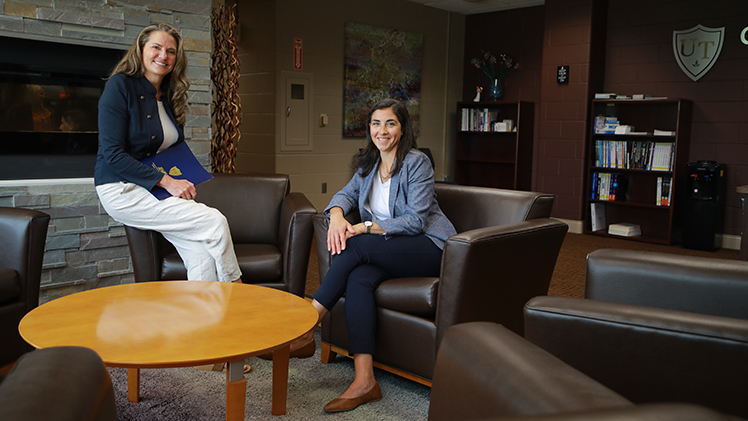As evidence piles up on how social determinants of health affect individuals and communities, The University of Toledo is reimagining how it prepares students for careers in a slate of healthcare occupations.
Earlier this year, the College of Health and Human Services launched a new Health Sciences program, offering two bachelor’s degrees and six individual concentrations, including pre-med, pre-rehabilitation sciences and pre-occupational therapy.

Health Sciences Program co-directors Dr. April Demers, left, an assistant visiting professor in the School of Population Health, and Dr. Sarah Long, a senior lecturer.
“This program feeds into sustained high-demand professions,” said Dr. Sarah Long, a senior lecturer and program co-director. “Students will receive excellent foundational knowledge and skills, as well as contemporary perspectives on healthcare delivery. We know there are aspects of our healthcare system that need to evolve to match the needs of the community, and we’re going to be preparing our students from the very beginning to help drive those changes.”
No matter their concentration, all students in the program will receive focused education on social determinants of health, healthcare inequity and a deeper look at the overall healthcare delivery system.
The new program, which offers bachelor of arts and bachelor of science degrees, effectively replaces UToledo’s previous exercise science major with a more modern, data-driven curriculum that’s better matched to the evolving needs of healthcare.
While the previous exercise science program produced strong graduates, the health sciences degrees expand on the prior program’s core offerings with new courses that provide a broader exploration of non-clinical factors that influence an individual’s overall health.
“There’s quickly becoming more awareness of the need to better prepare clinicians to holistically address social determinants of health. When those barriers are addressed, health outcomes improve tremendously,” said Dr. April Demers, an assistant visiting professor in the School of Population Health and co-director of the Health Sciences Program. “This is where healthcare is going, and this program is set up to provide our students that foundational knowledge.”
Viewed broadly, social determinants of health refer to how the environment in which people live affects their overall health and wellbeing.
Dr. Mark Merrick, dean of the UToledo College of Health and Human Services, said there’s also a deeper emphasis on the evolving way in which healthcare is viewed and delivered.
“There’s a bigger context in which all care happens. It’s focused on promoting health and avoiding the need for care as well as delivering that care in a way that is systematic,” he said. “Rather than embedding that content in your preparation to become a provider, we want it to be the foundation.”
Merrick said the new program should better position students for entry and success in professional programs after graduation. While some students may go directly into the workforce after completing their degree, a primary focus of the program is preparing students for graduate school.
Demers and Long expect a majority of students enrolling in the Health Sciences Program will do so with an eye toward a specific career, but one of the additional selling points of the new program is the flexibility it provides.
Regardless of concentration, students will take a pair of introductory courses during their first two semesters to explore all the concentrations within the health sciences major and other related programs at UToledo.
“As a 17-year-old high school student, you may not know all the career options that are out there,” Demers said. “We’re bringing in students who are passionate about helping people and passionate about health. We want to ensure we are helping those students find what aligns best for them.”
That, she said, might be another concentration under the umbrella of the health sciences program, like pre-physician associate or human performance and fitness promotion. Or it might be another of UToledo’s offerings, such as public health, respiratory therapy or the new radiation therapy program in the College of Medicine and Life Sciences.
UToledo also will for the first time offer a concentration specifically in social determinants of health through the health sciences bachelor of arts degree.
While social determinants of health is not a new theory, Demers said there has been an accumulation of evidence that things like barriers to reliable transportation, food instability and poor educational opportunities all negatively influence both individual and community health.
Incorporating that understanding throughout students’ undergraduate education, Merrick said, is important for developing future healthcare leaders who will continue to drive change in the field.
“There is a philosophical realignment in healthcare, and we’re developing the concepts in our curricula to be on the front edge of where healthcare is going, not where healthcare has been or is currently,” Merrick said. “This is a next step in the logical evolution of preparing healthcare providers of the future, and our program represents a really attractive pathway for somebody who wants to be a healthcare practitioner.”